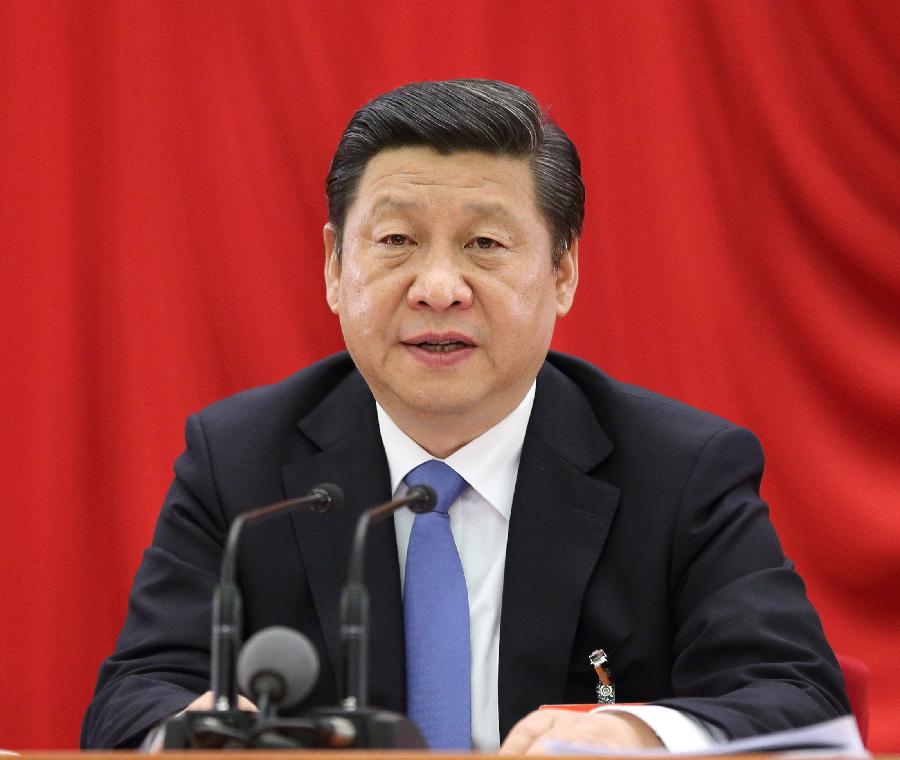 XIAMEN, Sept. 3 (Xinhua) — Chinese President Xi Jinping has shared his vision for the BRICS cooperation which he believes will enter a second “golden decade” if the emerging-market countries work together to overcome the challenges of weak growth and threats to world peace.
XIAMEN, Sept. 3 (Xinhua) — Chinese President Xi Jinping has shared his vision for the BRICS cooperation which he believes will enter a second “golden decade” if the emerging-market countries work together to overcome the challenges of weak growth and threats to world peace.
Addressing the BRICS Business Forum in Xiamen on Sunday, with Brazilian President Michel Temer and South African President Jacob Zuma in audience, Xi said after ten years a fully-fledged BRICS cooperation framework is taking shape.
With Russia’s Vladimir Putin and India’s Narendra Modi joining in, the leaders of the world’s five major developing countries will chart way forward for the bloc at the ninth BRICS summit scheduled for Sept. 3-5.
Xi on Sunday refuted the assertion that BRICS is losing luster.
He said despite headwinds causing growth setbacks, the BRICS countries are “fully confident” about their growth potential and the future outlook.
TANGIBLE BENEFITS
BRIC was first coined in 2001 to describe four emerging economies with fast growth and great potential. The concept turned into a formal cooperation framework in 2006. Four years later, South Africa joined. BRIC became BRICS.
Xi said the past decade has seen the BRICS countries making headway in pursuing common development. Their combined GDP grew 179 percent, trade increased 94 percent and urban population expanded 28 percent during the period.
The development of the BRICS countries over the past decade has delivered tangible benefits to more than 3 billion people.
Xi said three important practices of the shared value should be carried forward — treating each other as equals, seeking results-oriented cooperation, and bearing in mind the well-being of the world.
“Dialogue without confrontation, partnership without alliance,” Xi summed up the cooperation principle in a simple phrase.
He said the principle has gained growing endorsement and has become a positive energy in the international community.
RISING UP TO CHALLENGES
The Chinese president said the global economy remains in a period of adjustment featuring weak growth and no apparent new drivers. Due to sluggish growth, protectionism and inward-looking mentality are on the rise. Uneven development and a deficit of fairness have become more acute.
He challenged BRICS countries to create new impetus for growth and continue to improve global economic governance.
“We should not ignore problems arising from economic globalization or just complain about them. Rather, we should make joint efforts to find solutions,” Xi said.
He said the BRICS countries should promote the building of an open global economy, advance trade and investment liberalization and facilitation, build new global value chains, and rebalance economic globalization.
“Only openness delivers progress, and only inclusiveness sustains such progress,” Xi said.
The long road to peace is not smooth, Xi said, calling on the BRICS countries to play a constructive part in the process of resolving geopolitical hotspot issues and make due contributions.
He envisioned flames of war dying and displaced refugees returning home as dialogue and consultation settle issues in Syria, Libya and the Palestine-Israel conflict.
MAKING BIGGER PIE
The Chinese president said the development of emerging market and developing countries is not intended to “move the cheese of anyone” but to “make the pie of the global economy bigger.”
Over the past ten years, the share of the five BRICS countries in the global economy has more than doubled. They have contributed to more than half of global growth.
Xi said more emerging market and developing countries should be involved because BRICS, as a platform with global influence, concerns more than five countries.
During the Xiamen summit, China will hold the Dialogue of Emerging Market and Developing Countries, where the leaders of Egypt, Guinea, Mexico, Tajikistan and Thailand will join the BRICS leaders in discussing global development cooperation and South-South cooperation.
While outreach programs have existed in past BRICS summits since 2013, it is the first time participating leaders have come from around the world, but not just neighbors of the host country.
Xi said this “BRICS Plus” approach should be promoted to build an open and diversified network of development partners for the bloc.
MARCHING ON WITH REFORM
Turning to China, Xi said the country had made the “right choice” on deepening reform and will march on in strides.
“The past decade has not only seen solid progress in the BRICS cooperation; it has also witnessed the unfolding of all-round reform and opening up in China and its rapid economic and social development,” Xi told the forum.
He said China’s economic aggregate grew by 239 percent over the past ten years and the lives of its 1.3 billion-plus people have been significantly improved.
In the first half of 2017, the Chinese economy expanded by 6.9 percent and added 7.35 million new urban jobs.
Xi said China has been making increasingly more contribution to regional and global economy.
He said the Belt and Road Initiative, for example, is not a tool to advance any geopolitical agenda, but a platform for practical cooperation.
The initiative is not a foreign aid scheme, but one that advocates interconnected development with extensive consultation, joint contribution and shared benefits.
“Going forward, China will continue to put into practice the vision of innovative, coordinated, green, open and inclusive development,” he said.
“We will adapt to and steer the new normal of economic development, push forward supply-side structural reform, accelerate the building of a new system for an open economy, drive economic development with innovation, and achieve sustainable development,” Xi said.

